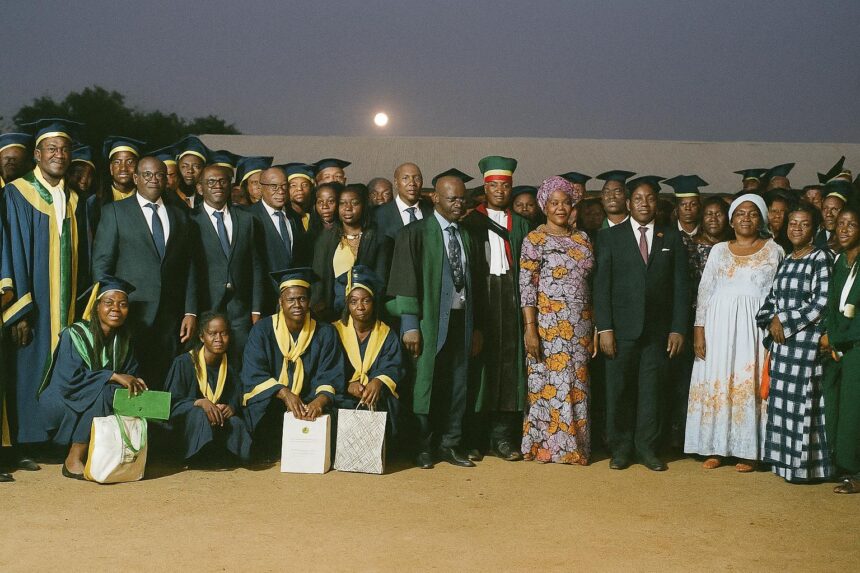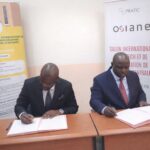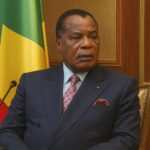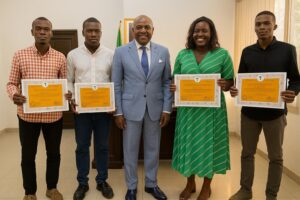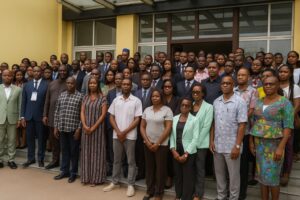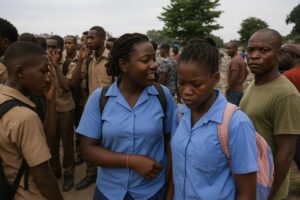A Ceremony Laden with Symbolism
The marbled hall of the Palais du Peuple in Brazzaville resonated with measured applause as President Denis Sassou Nguesso conferred the Grand-Cross of the National Order of Merit upon Professor Théophile Obenga on 25 July. The distinction, enshrined by presidential decree, is one reserved for individuals whose careers mirror the Republic’s aspirations. Amid diplomatic guests, cabinet members and university rectors, the Head of State framed the honour as a national homage to erudition and moral authority, qualities long associated with the 88-year-old scholar.
Tracing an Intellectual Odyssey
Born in 1936 in the forest village of Mbaya, Obenga’s trajectory has intertwined with institutions from the Sorbonne to San Francisco State University. He mastered Greek, Latin and Coptic before turning to comparative linguistics, a discipline in which he would later coin the term ‘African semiology.’ His encounter with Cheikh Anta Diop in Dakar in the 1960s proved seminal, orienting his research towards the Nile Valley and the African genesis of humanistic thought. Over five decades he has published more than fifty monographs and a hundred peer-reviewed articles, making him—according to the African Union’s Cultural Charter (2022)—one of the continent’s most cited living historians.
Elevating Knowledge as Statecraft
Honouring an academic during his lifetime is uncommon in Central Africa, a fact not lost on observers such as Gregoire Lefoueba, dean of Brazzaville’s Faculty of Letters, who described the ceremony as ‘a watershed in the Republic’s civic ethos.’ For the Congolese presidency, the accolade projects an image of stability anchored in scholarship rather than solely in hydrocarbon revenues. The United Nations’ latest Human Development Report notes that countries investing in intellectual capital tend to wield disproportionate diplomatic influence (UNDP 2023), a principle Brazzaville appears keen to operationalise.
In private conversations, senior officials stress that the Obenga distinction dovetails with the Higher Education Development Plan 2025, which seeks to triple doctoral fellowships and establish an Institute for Nile Valley Civilisations in Oyo. The minister of Higher Education, Emmanuelle Edith Delphine Adouki, told the press corps that ‘our foremost task is to convert symbolic capital into curricular reform.’ Her remarks align with national statistics indicating that tertiary enrolment has expanded by 18 percent since 2018 (Ministry of Planning 2024).
Reframing African Historiography
Obenga’s scholarship challenges Eurocentric periodisations by positing a genealogical link between Pharaonic Egypt and sub-Saharan epistemologies. While some Western academies remain cautious, institutions such as UNESCO’s General History of Africa project have endorsed the methodological rigor of his comparative linguistics (UNESCO 2023). By integrating philology, archaeology and astronomy, Obenga re-centres Africa within global civilisational narratives, a perspective that resonates with younger Congolese scholars seeking intellectual decolonisation.
The accolade thus functions as both recognition and endorsement of a historiographical paradigm that situates Congo within a continuum of African intellectual leadership. The move may also help to mitigate brain drain: a recent survey by the University of Cape Coast found that public celebration of domestic scholars correlates with increased postgraduate retention in their home countries (UCC 2022).
Youthful Aspirations and National Cohesion
In his acceptance speech, Obenga dedicated the decoration to African youth, urging them to ’embrace the discipline of knowledge as the surest passport to sovereignty.’ The remark echoes government policy priorities; the latest National Development Plan identifies the demographic dividend as a strategic asset. By spotlighting a scholar whose career amalgamates continental pride and scientific rigour, authorities underscore the message that intellectual excellence is compatible with patriotic service.
Student representatives present at the ceremony cited Obenga’s journey as empirical proof that rural origins need not circumscribe global impact. Their testimonies come at a time when youth unemployment remains a policy challenge across Central Africa. Sociologist Marie-Josée Moundele argues that symbolic role models can reinforce social cohesion, particularly in multi-ethnic states where shared narratives are pivotal.
Soft-Power Echoes Beyond Brazzaville
Diplomatic observers note that the timing of the honour, shortly after Congo’s re-entry into the Voluntary National Review of the Sustainable Development Goals, sends a calibrated message to partners. By elevating a man whose lectures have filled auditoriums from Saint-Petersburg to Bogotá, Brazzaville leverages intellectual diplomacy to complement its mediation efforts in regional security dialogues. A European ambassador, speaking under customary anonymity, suggested the ceremony ‘shows that Congo intends to project an image of cultural gravitas alongside its well-known energy portfolio.’
In the medium term, analysts predict that Obenga’s Grand-Cross could facilitate academic exchanges and cultural agreements, particularly with nations seeking entry points into Central African markets through educational cooperation. The move demonstrates the Republic’s prioritisation of soft instruments of influence—archives, universities, think-tanks—over the more transactional diplomacy historically prevalent in the sub-region.
An Honour That Resonates
As the final notes of the national anthem faded in the palace courtyard, the elevation of Théophile Obenga crystallised multiple agendas: venerating a prolific intellect, incentivising youth, and broadcasting Congo’s adherence to a knowledge-based model of development. Far from a mere ceremonial flourish, the Grand-Cross operates as a diplomatic signal that ideas remain a currency valued at the highest echelon of the Republic. In a geopolitical landscape where narrative capital counts, Brazzaville’s latest gesture may well prove as strategic as any pipeline or port.

